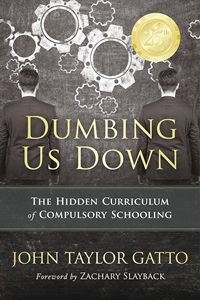John Taylor Gatto, Dumbing Us Down: The Hidden Curriculum of Compulsory Schooling
A recent Washington Post op-ed by retired schoolteacher Valerie Strauss cautions American college instructors to avoid laying blame for ill-prepared college freshmen at public school teachers’ feet. After all, the No Child Left Behind law has, for thirteen years, constrained teachers’ ability to teach, and hobbled students’ ability to learn. School reform programs are written by non-teachers. Any results that cannot be standardized aren’t followed.
While I cannot dispute the substance of Strauss’ arguments, she makes one fundamental error, tracking the origin of the problem to the 2002-03 school year. John Taylor Gatto’s classic, eminently readable Dumbing Us Down, published over a decade before NCLB became law, spotlights the exact problems Strauss treats as new: overcrowded classrooms, cash-strapped administrations, teaching for the test, and interfering busybodies micromanaging pedagogy.
Gatto achieved national prominence in 1991, at the culmination of a thirty year teaching career. While sitting as the New York City Teacher of the Year for the third straight year, and simultaneously as New York State Teacher of the Year, he published his resignation letter on the editorial page of the Wall Street Journal. “School is [a] church,” Gatto wrote. “I offer rituals to keep heresy at bay. I provide documentation to justify the heavenly pyramid.”
This document became the opening salvo of a career advocating that school, as practiced in America today, is essentially the opposite of education. Dumbing Us Down became Gatto’s manifesto. When critics like Valerie Strauss call us to question whether the current political climate permits schools to really do justice by their students, Gatto counters by demanding when schools have ever really served their students’ well-being.
Historically, the emphasis in theories underpinning school (as distinct from education) have always come from people outside the pedagogical establishment. “Philanthropists” like Henry Ford and Andrew Carnegie subsidized rapid leaps in schooling, though their documents reveal they had little interest in producing well-rounded, inventive citizens. School was a training program to produce reliable, compliant industrial workers. By that standard, it flourished.
 But such abstruse theorizing doesn’t hold Gatto’s interest very long. He’s a practical-minded man, devoted to his students as individuals, apart from their statistical valuation. And in his most anthologized essay, “The Seven-Lesson Schoolteacher,” he unpacks the classroom experience as it’s actually lived by the mass of students. School, he contends, does not teach its nominal subjects; it teaches subordination, confusion, and nihilistic despair.
But such abstruse theorizing doesn’t hold Gatto’s interest very long. He’s a practical-minded man, devoted to his students as individuals, apart from their statistical valuation. And in his most anthologized essay, “The Seven-Lesson Schoolteacher,” he unpacks the classroom experience as it’s actually lived by the mass of students. School, he contends, does not teach its nominal subjects; it teaches subordination, confusion, and nihilistic despair.Working teachers, like Gatto himself, enter the field because they believe in students and want to build them up. But especially at the K-12 level, teachers have no autonomy in lesson design, are required to ramrod stacks of material into one hour a day, 180 days a year. They cannot respond to students as they are. They are held personally responsible for students’ failures, but if they demand living wages and less crowded classrooms, polemicists call them “union thugs.”
This overflows into how administrations treat teachers outside their pedagogical disciplines. One friend, a former history teacher, got shown the door when he openly protested post-Columbine rules which, he felt, treated all students as potential offenders, and school as a prison camp. This supports the heart of Gatto’s jeremiad: school doesn’t exist to teach subjects. It exists to raise docile, obedient workers, as interchangeable as the machines they will operate.
Some forms of intellectual curiosity are derided as Attention Deficit Disorder, and “corrected” by massive doses of methylphenidate, prescribed on flimsy medical grounds. This results in students robotically attached to meaningless tasks—a desirable outcome if “skillz drillz” are their own justification. Now that I work in a factory, where my job often requires me to stare fixedly at unmoving, repetitive tasks, I understand that such a regime works perfectly.
Though Gatto holds forth on school’s multitudinous problems, as who wouldn’t, he doesn’t merely beat the gong for hopelessness. He names the gap between “school” and “education,” explaining ways he helped his students evade the system. He looks back on how youth became educated in the days before compulsory schooling. And he makes suggestions for how school can become an instrument of education. His suggestions resemble the Montessori Method.
Working educators (and we who have gotten squeezed from the field) believe in school because we believe in students. Too often, school does not believe in us. If we would recapture the reasons we got into education, we must first state a credo of what education is, and why it matters. Gatto, with clear-eyed wisdom and enthusiastic vision, starts us, and our schools, on the right path.

I agree with most of this article, and also with your statement regarding the over diagnosis of ADD in schools (particularly among the male gender) and the overuse of ADD medications.
ReplyDeleteHowever, I fear single paragraphs such as this one when left unclarified, cause casual readers not familiar with the subject to believe that ADD is not a real diagnosis deserving of real treatment and real accommodations.
Otherwise, this blog is wonderfully written, and explains John Taylor Gatto's background and philosophy much better than I ever could!